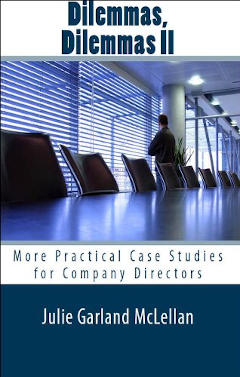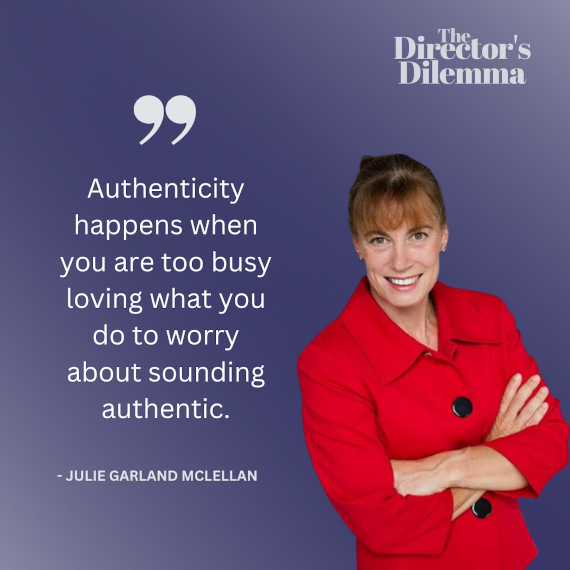|
|
|
|
|
|
|
|
|
Dear reader,
Welcome to The Director's Dilemma December 2022
Each month this newsletter looks at a real-life scenario that happened to a board, perhaps to a board like yours, and considers a range of responses. The scenarios are de-identified to protect the individuals concerned. This month we advise a passionate director who is facing a difficult decision of whether to stay or leave her board.
The advice is general and designed to start your own thinking about how this could be approached in your personal context. If you would like specific advice, I work with boards and directors as a confidential mentor to help them build great companies and maximise their impact, and am an experienced board mentor.
To read this email in a web browser, go to www.mclellan.com.au/newsletter.html and click on 'read the latest issue'. I hope you will enjoy the latest dilemma:
 Yolanda is a young director who joined a not for profit foundation in the education sector. The foundation had a fairly unsuccessful first fifteen years of haphazard fundraising. It was criticised by the community and the school Principal who claimed it did not do enough to support the school. Yolanda is a young director who joined a not for profit foundation in the education sector. The foundation had a fairly unsuccessful first fifteen years of haphazard fundraising. It was criticised by the community and the school Principal who claimed it did not do enough to support the school.
A new board chair joined last year and instituted a significant shift in the board governance. He introduced a skills-based board and there was almost a complete change over of board directors. He recruited Yolanda who relished the chance to put her commercial skills to use in designing a new strategy for the foundation.
Now nearly all of the newly recruited directors are stepping down. The terms were staggered so some are simply not standing for re-election but others are leaving mid term. One director has openly said it is because of concerns about the Principal's performance, the others are publicly saying it is because of the time commitment. However, informally, three directors have told Yolanda they are also concerned about the Principal and not prepared to put in the effort when the Principal treats them as an irrelevance and doesn't help the board in any way. At meetings he is keen to hear about the funds raised but reluctant to divulge information about the school's plans or to take an interest in the governance and operations of the foundation.
Yolanda's term has another year and she wants to remain on the board to fulfil her obligations and support the foundation. She just isn't sure that is a good idea. Perhaps there might be something big that she's missing.
How would you advise her?
|
|
|
|
Laura's Answer

One of the most important roles of the Board is oversight of the CEO. I see the board directors lacking the appetite to provide feedback about the CEO/Principal's performance as a serious issue. On one hand it is preferable for these directors to leave the Board when they are unwilling to take action or speak freely. However, it points to a broader issue that could be a lack of psychological safety or understanding of the board's responsibilities.
Yolanda is facing a challenging tension between her self-interest (reputational risk) and the interests of the foundation. She is right to be concerned about the significant turnover of the board. I would encourage Yolanda to probe to understand more about the situation. Specifically, I would suggest a phone call to each of the outgoing directors and also to speak directly with the Board Chair about her concerns.
The call with the Chair may be a tricky conversation if a lack of psychological safety is caused by the Chair's style. I would advise her to prepare a careful list of questions rather than statements to speak with the Chair about. Topics could include why the chair believes the directors have recently resigned, how the Board can maintain oversight of the Principal's performance during high turnover of directors, and what role should Yolanda play as the remaining director (and soon to be longest standing on the board).
If Yolanda chooses to remain on the board, she should be involved in the recruitment panel for new directors and suggest a review of the current processes for evaluating the CEO's and board's performance to be implemented with the new board.
Laura Wedmaier is a board member and chair of the finance, audit and risk committee for Ipswich Hospital Foundation. She is based in Cronulla, NSW, Australia.
|
|
|
|
Julie's Answer

Yolanda is witnessing the impact of poor structure alignment: her foundation raises funds for the school, but it does not have any power to direct the school principal. The school principal reports to the school board. Supporting the foundation not a top priority.
If Yolanda decides to stay, she will need to work hard to establish alignment between the foundation board and that of the school. Unless the school board require the principal to assist the foundation by divulging information about plans, it will be almost impossible to raise significant funds or govern effectively. This is true regardless of whether the principal is a member of the foundation board or merely expected to report to it.
Yolanda should first read both her own constitution and that of the school to understand the degree of alignment, then talk with her current chair and understand what is inhibiting stronger alignment between the school and foundation boards.
She should then use that knowledge to open a dialog with the chair of the school board. If that dialog is productive, she can ask for the two boards to cooperate by sharing information and developing a fundraising program that both boards feel is appropriate and inspiring. The school board must task the principal to support, rather than undermine, the foundation. At present the principal gets whatever is raised, has no need to help raise it, and can criticise with impunity.
No board can lead its organisation to prosperity and success without understanding and building relationships with stakeholders. The school is the foundation’s most important stakeholder. If the relationship is irredeemably damaged, Yolanda should leave the board. It won’t get any better.
Julie Garland McLellan is an experienced non-executive director and board advisor based in Sydney, Australia. She travels the world providing director education and board development.
|
|
|
|
Albert's Answer

Accepting a Board role brings responsibilities and is not for people that cannot form their own, independent opinions or people that will automatically follow others. Think independent and be resilient.
Yvonne said yes to the Board role and now faces issues in her role.
She can remain in the Board, open up the discussion with the Board of the School (Employer of the Principal) and discuss the issues at hand. A heads-up for the employer on performance of their employee, but also needed input for her from the school for her new strategy; improving the fundraising.
A regular exchange of info, can be organized between the two Boards, they share the goal of improvement for the school at large.
Given her expertise, her base for nomination by the previous Chair of the Foundation, she can work on the improved strategy in the meantime, making sure that everything does not come to a complete standstill. The Chair of the Trust is still there, they should reflect together on the skills based Board composition.
Albert Froom is Managing Partner at The Leaders Trust. He is based in The Randstad, Netherlands.
|
|
|
|
What's online? - You might like to visit and subscribe to my YouTube channel to see all the videos on practical boardroom issues. There are now 65 videos on a range of board topics. Let me know of any topics you would like to see addressed and I will see if I can make that into a video for you. There are also some full-length videos of courses and conference presentations plus my candid thoughts on boards in the news. Please subscribe as I'm trying to build the channel. I promise I won't send you spam from YouTube!
Be a contributor - if you would like to attempt a response to the dilemmas for publication you will be most welcome. Simply reply to this email and let me know. I am always on the look out for new talent from around the world so please reach out if that sounds like something you could do. I am also always grateful for the generous sharing of the current and past contributors. I couldn’t create such an engaging newsletter without their help.
Let me help you - I would be delighted to speak for or train your board, staff, audience and/or group. My work covers director and whole board development and mentoring, board reviews, recruitment, and training executives in writing board papers. If I can help, please contact me at julie@mclellan.com.au.
Book Review - Dilemmas Dilemmas II by Julie Garland McLellan.

A perfect Christmas gift for any director!
Guaranteed to provide a diverse range of ideas that will stimulate and extend the readers governance abilities as well as entertain and educate.
This collection of case studies is drawn from real life situations and features the collected wisdom of forty five different directors from companies large and small.
Available from Amazon.com and Amazon.com.au.
Inspirational quote for December

Focus your director and board development
Boards often struggle to get cut through and drive company performance. They work hard, then they work harder, then call in a consultant who recommends some changes, then they work harder still.
If that sounds like your board, don't worry. It is likely that you have simply been focusing on the wrong stuff. I have made a diagnostic tool that might help you to prioritise the actions that will free your board from the drudgery and allow you to maximise your impact. You can take the diagnostic here:
https://directorsdilemma.scoreapp.com
Call me afterwards for a personalised action plan to revitalise and enhance the impact of your board work.
A note on names - A few readers have asked me where I find the names for the protagonists in each case study; I 'borrow' them from people I meet or things that I read. Yolanda is a female given name, of Greek origin, meaning "Violet". The form of the name in Greek is Iolanthe. Our Yolanda needs to decide if she will be a shrinking Violet or if she wants to tackle this issue until it is resolved.
This newsletter - If you have any ideas for improving the newsletter please let me know. If you are reading a forwarded copy, please visit my website and sign up for your own subscription.
Suggestions for dilemmas - Thank you to all the readers who have suggested dilemmas. They are greatly appreciated. I will answer them all eventually. I could not write this newsletter without your help and without the generous help of all the experts who respond each month to the case studies.
Let's connect - I use LinkedIn to share information about boards and directorship with my friends and acquaintances. If you use LinkedIn and we are not yet connected I will welcome a connection from you. You can find me at linkedin.com/in/juliegarlandmclellan.
Farewell until the next issue due 1 January 2023. I look forward to greeting you again then.
Enjoy governing your companies and the Christmas holiday season!
Best regards,
Julie

Main photo by Paloma Clarice at Pexels.com
Quote picture by Keitchy Sanchez for Julie Garland McLellan
Disclaimer: The opinions expressed above are general in nature and are designed to help you to develop your judgement as a director. They are not a definitive legal ruling and do not constitute legal advice. Names and some circumstances in the case study have been changed to ensure anonymity. Contributors to this newsletter comment in the context of their own jurisdiction; readers should check their local laws and regulations as they may be very different.
Privacy: I am privileged to have your contact details and keep them as safely as possible. I will alert you if they are ever accessed by any unauthorised person (the technical staff at ayuda help with publishing and issuing the Director's Dilemma and have access so they can send the newsletters to you). I do not sell your details to anyone; they are kept only for the intended purpose - sending you this newsletter and helping to build the judgement of company directors by providing a safe way to consider potential responses to real life events.
|
|
|
|
|
|
|
 Yolanda is a young director who joined a not for profit foundation in the education sector. The foundation had a fairly unsuccessful first fifteen years of haphazard fundraising. It was criticised by the community and the school Principal who claimed it did not do enough to support the school.
Yolanda is a young director who joined a not for profit foundation in the education sector. The foundation had a fairly unsuccessful first fifteen years of haphazard fundraising. It was criticised by the community and the school Principal who claimed it did not do enough to support the school.





